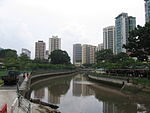Centre for Quantum Technologies
2007 establishments in SingaporeNational University of SingaporePhysics institutesQuantum information scienceResearch institutes in Singapore
The Centre for Quantum Technologies (CQT) in Singapore is a Research Centre of Excellence hosted by the National University of Singapore. The Centre brings together physicists, computer scientists and engineers to do basic research on quantum physics and to build devices based on quantum phenomena. Experts in quantum technologies are applying their discoveries in computing, communications and sensing.
Excerpt from the Wikipedia article Centre for Quantum Technologies (License: CC BY-SA 3.0, Authors).Centre for Quantum Technologies
Geographical coordinates (GPS) Nearby PlacesShow on map
Geographical coordinates (GPS)
| Latitude | Longitude |
|---|---|
| N 1.2971 ° | E 103.7781 ° |






